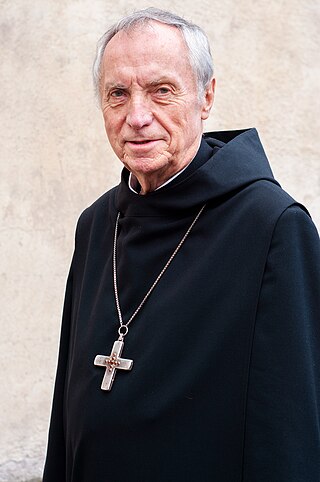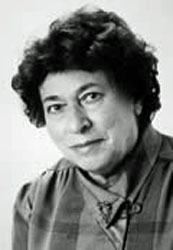Related Research Articles

Notker Wolf is a German Benedictine monk, priest, abbot, musician, and author. He is a member of St. Ottilien Archabbey located in Bavaria, Germany, which is part of the Benedictine Congregation of Saint Ottilien. He previously was elected and served as the ninth Abbot Primate of the Benedictine Confederation of the Order of Saint Benedict. He was elected to his position as Abbot Primate in 2000 and ended his final term in 2016.
Erwin Oberländer is a German historian and expert on Eastern European history. He is Professor Emeritus of Eastern European History at the University of Mainz. He is also a former President of the German Association of Historians of Eastern Europe, and was appointed by the Latvian government as a foreign member of the Commission of the Historians of Latvia, which was tasked with studying crimes against humanity in Latvia during the Soviet and Nazi occupations.

Wolfgang Benz is a German historian from Ellwangen. He was the director of the Center for Research on Antisemitism of the Technische Universität Berlin between 1990 and 2011.

The Freiburg–Colmar railway was an international railway that formerly connected Freiburg im Breisgau, in the German state of Baden-Württemberg, with Colmar, in the French department of Haut-Rhin. The line crossed the river Rhine on a bridge between Breisach and Neuf-Brisach. Since that bridge was destroyed in 1945, the line from Freiburg has terminated at Breisach, and this stretch of line is now commonly called the Freiburg–Breisach railway, or the Breisacherbahn. The section from Freiburg to Breisach was completed in 1871 and the remainder in 1878.

Operation Tigerfish was the military code name in World War II for the air raid on Freiburg in the evening of 27 November 1944 by the Royal Air Force with about 2,800 dead.
Helmut Karl Otto Beumann was a German historian.
Frank Zöllner is a German art historian. He is among the leading authorities on the life and works of Leonardo da Vinci, about whom he has written numerous publications on. These include book-length studies on the Mona Lisa and one of the two modern catalogue raisonné of Leonardo's works, the other being by Pietro C. Marani.
Bernd Jochen Hilberath is a German Roman Catholic theologian.
Hedwig Röckelein is professor of medieval history at the University of Göttingen, Germany.

Wolfram Wette is a German military historian and peace researcher. He is an author or editor of over 40 books on the history of Nazi Germany, including the seminal Germany and the Second World War series from the German Military History Research Office (MGFA).

Ingeborg Weber-Kellermann was a German folklorist, anthropologist and ethnologist. She was an academic teacher, from 1946 at the German Academy of Sciences at Berlin in East Berlin and from 1961 at the University of Marburg.

The History of the Jews in Freiburg dates back to the Late Middle Ages when, at the site of today's Wasserstraße and Weberstraße, there was reference to a ghetto. In 1328, a synagogue was located at 6 Weberstraße.
Fred K. Prieberg was a German musicologist. He was a pioneer in the field of history of music and musicians under the Nazi regime.
Ernst Walter Zeeden was a German medievalist and a scholar of modern history.
Walther Rehm was a German literary scholar.
Franz Schnabel was a German historian. He wrote about German history, particularly the "cultural crisis" of the 19th century in Germany as well as humanism after the end of the Third Reich. He opposed Nazism during the Second World War.
Helmut Neuhaus is a German historian who specialises on the Early modern period. From 1989 to 2009 he held the Chair of Modern History I at the University of Erlangen–Nuremberg.
Matthias Untermann is a German art historian and medieval archaeologist.

Dieter Pohl is a German historian and author who specialises in the Eastern European history and the history of mass violence in the 20th century.
Soziale Frauenschule was the name given to certain educational institutions that emerged in Germany between the turn of the century and the beginning of the 1920s.
References
- ↑ Hermann, Heiko on dg.philhist.unibas.ch
- ↑ See for example an issue from 1989.
- ↑ Das Argument
- ↑ Article in the Badischen Zeitung.